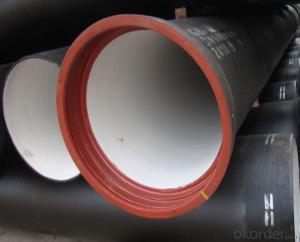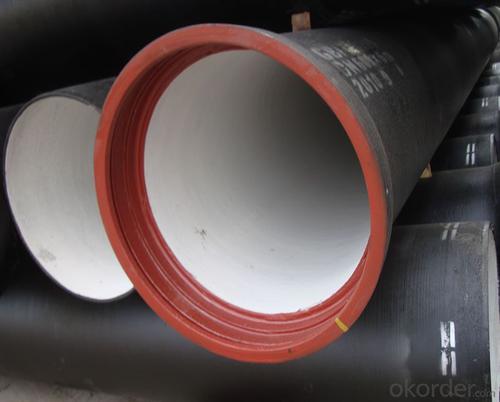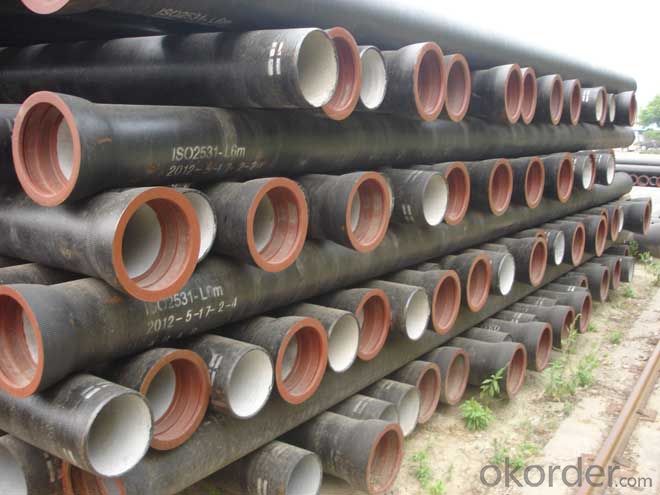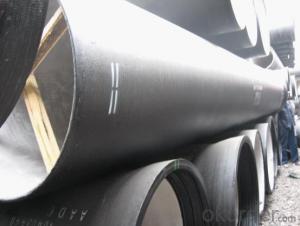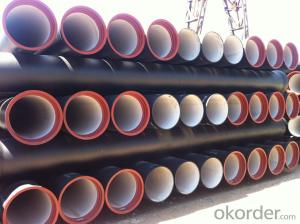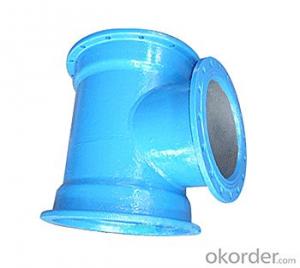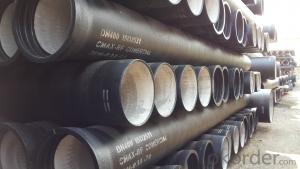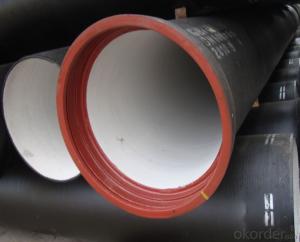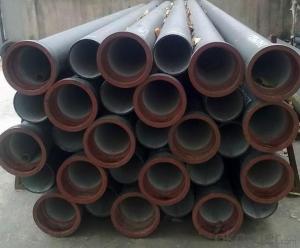Ductile Iron Pipe of China DN600 Factory Price EN598
- Loading Port:
- China main port
- Payment Terms:
- TT or LC
- Min Order Qty:
- 25 m.t.
- Supply Capability:
- 300000 m.t./month
OKorder Service Pledge
OKorder Financial Service
You Might Also Like
1,Ductile Iron Pipe Description :
1) Pipes confirm to ISO2531,K9 class,T type joint,6m long,with inside cements lining conform to ISO4179, outside Zinc spraying(130g/m2) and bitumen coating(70μm) conform to ISO8179.
2) Pipe ends: Spigot and socket ends, with 100% SBR rubber gaskets accoding to ISO4633
2,Main Features of the Ductile Iron Pipe:
·High yield strength
·High tensile Strength
·High corrosion resistance
·Installation is convenient
·Satisfy the highest hygienic standards
3,Ductile Iron Pipe Images:
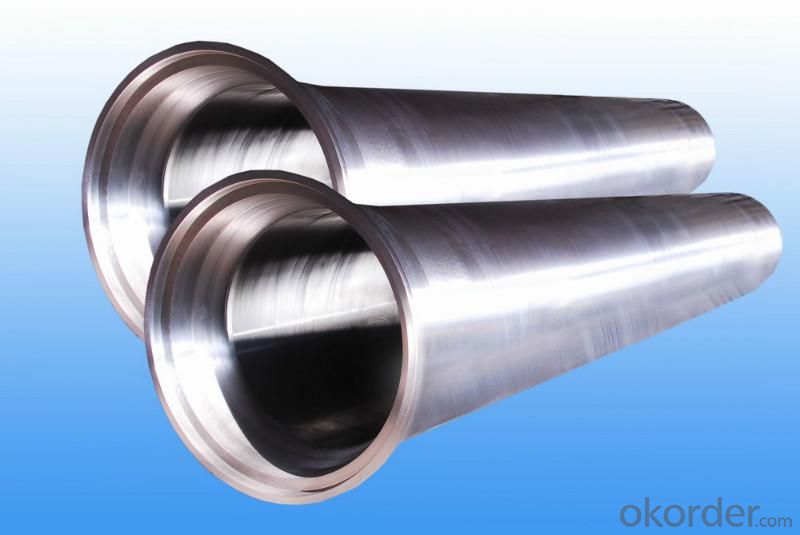
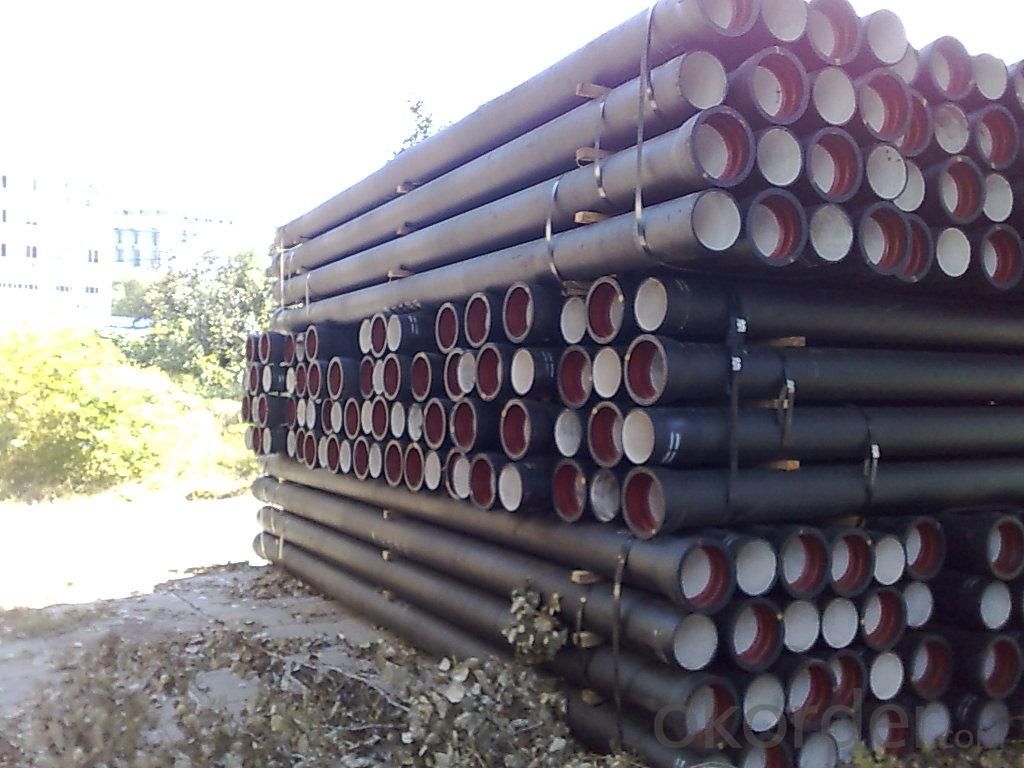
4. Ductile Iron Pipe Specification
Place of Origin: China (Mainland)
Model Number: DN80-1600 Length: 6M/5.7M/NEGOTIATED Standard: ISO2531 / EN545
Application: Potable/Sewage Water
Diameter: DN80-1600
Shape: Round
Hardness: 230 Pipe
Wall Thickness: standerd
Pull Strength: 420
Yield (≥ MPa): 300
Material: Ductile Iron water ductile iron pipe: SO2531 / EN545 DI pipe
5.FAQ:
We have organized several common questions for our clients,may help you sincerely:
1.Q:Why can you guarantee the inner of pipes can’t be corroded?
A: High alumina cement mortar lining and sulphate-resistant cement mortar lining. These two special linings are applicable to inner anti-corrosion for sewage pipes, improving resistance to erosion of the sewage components.
2.Q: Why would you choose ductile iron pipe rather than other pipe materials?
A:The reasons are obvious for that not only ductile iron pipe possesses the inherent strength and flexibility of ductile iron, combined with proven corrosion protection systems, but also the cost savings can be achieved from design to installation and commissioning.
- Q: What are the typical joint restraint requirements for ductile iron pipes?
- Ductile iron pipes typically require joint restraints to prevent separation or pulling apart. Two common types of restraints are mechanical joint restraints and push-on joint restraints. Mechanical joint restraints are used when the pipe faces high internal pressures or external loads. They consist of a gland and a follower gland that are tightened around the joint with bolts or clamps. This secures the joint and prevents movement. On the other hand, push-on joint restraints are used when the pipe doesn't face high pressures or loads. They provide a seal and prevent separation due to ground movement or external forces. Push-on joint restraints are installed by pushing the pipe into the joint and securing it with a ring or collar. In addition to joint restraints, proper bedding and backfill materials are important for ductile iron pipes. These materials help distribute loads and provide stability, further enhancing the pipe's resistance to joint separation. It's important to note that the specific joint restraint requirements may vary depending on project specifications, pipe size, and operating conditions. Therefore, consulting the manufacturer's recommendations and engineering standards is essential for selecting and installing the proper restraints.
- Q: Can ductile iron pipes be used in acidic environments?
- Ductile iron pipes are capable of being utilized in acidic environments. These pipes possess a strong resistance to corrosion, rendering them suitable for a wide range of applications, including those involving acidic conditions. The heightened carbon content found in ductile iron pipes generates a shielding layer on the pipe's surface, effectively thwarting direct attacks from acid on the iron. Furthermore, the interior lining of the pipe can be coated with epoxy or other protective substances to bolster its resistance to corrosion in acidic settings. Nevertheless, it is crucial to take into account the precise concentration and type of acid present within the environment, as certain acids may still induce corrosion over time. It is highly recommended to seek counsel from professionals or manufacturers to ensure the appropriate selection of materials for specific acidic conditions.
- Q: Nodular cast iron, heat treatment process and so on
- White cast iron is one of the defects. Firstly, control of carbon equivalent, carbon equivalent is not too high. The second inoculation is reasonable, the step of determining whether carbon in cast iron with graphite precipitation. Ensure adding good inoculant humectant and sufficient time. Once again, the problem of cooling. The cooling can not be too fast, easy fast cooling to produce white tissue.
- Q: What is the expected bedding and backfill requirements for ductile iron pipes?
- The expected bedding and backfill requirements for ductile iron pipes are vital for ensuring the longevity and proper functioning of the pipe system. Ductile iron pipes are known for their durability and strength, but they still require careful installation to prevent any potential damage or compromised performance. The bedding requirements for ductile iron pipes involve providing a stable and uniform support system to distribute the loads and stresses from the surrounding soil. The pipe should be surrounded by a bedding material that is free from rocks, debris, or any sharp objects that could potentially cause damage. The bedding material should also have sufficient compaction to prevent settlement or shifting that could lead to misalignment or pipe failure. Typically, the bedding material used for ductile iron pipes is a granular material, such as sand or fine aggregate, with a thickness of at least 6 inches. This material should be placed beneath and around the pipe in a uniform manner to provide a continuous support system. Additionally, the bedding material should be compacted to at least 90% of the maximum dry density to ensure proper stability and load distribution. Backfill requirements for ductile iron pipes involve the material used to fill the remaining space around the pipe after the bedding has been installed. The backfill material should also be free from rocks, debris, or sharp objects that could potentially damage the pipe. It should provide support and protection to the pipe while allowing for proper compaction and settling. The backfill material for ductile iron pipes is typically a granular material, such as sand or fine aggregate, with a maximum particle size of 1 inch. The backfill material should be placed and compacted in layers, ensuring that the compaction is done uniformly and evenly around the pipe. The compaction should be sufficient to prevent settlement or shifting of the backfill material, which could lead to pipe damage or misalignment. In summary, the expected bedding and backfill requirements for ductile iron pipes involve using a granular material that is free from rocks, debris, or sharp objects. The material should be placed and compacted in a uniform manner to provide stable support and protection to the pipe. Adhering to these requirements will help ensure the proper functioning and longevity of ductile iron pipe systems.
- Q: What are the advantages of using ductile iron pipe?
- Using ductile iron pipe in various applications offers several benefits. Firstly, ductile iron pipe is renowned for its strength and durability. It possesses higher tensile and yield strengths compared to other pipe materials, making it highly resistant to cracking, bending, and breaking. This exceptional strength enables the pipe to withstand high-pressure and heavy-load conditions, making it an ideal choice for applications such as water and sewage systems, oil and gas pipelines, and industrial piping. Secondly, ductile iron pipe exhibits excellent corrosion resistance. It is coated with a protective layer, typically zinc or epoxy, which prevents rusting and corrosion. This coating ensures a longer lifespan for the pipe, even in harsh environments or when transporting corrosive fluids. Another advantage of ductile iron pipe lies in its flexibility. Unlike rigid pipes, ductile iron pipes possess a certain level of flexibility, enabling them to endure ground movements and settle without fracturing. This flexibility proves particularly advantageous in areas prone to earthquakes or soil settlements. Additionally, ductile iron pipe boasts a smooth inner surface, minimizing flow resistance and enhancing fluid transportation efficiency. It also reduces the likelihood of sediment accumulation or corrosion within the pipe, resulting in improved flow rates and decreased maintenance requirements. Furthermore, ductile iron pipe proves cost-effective in the long run. Although it may entail higher initial costs compared to other pipe materials, its durability and minimal maintenance needs make it a cost-effective choice over time. The extended lifespan of ductile iron pipe reduces the necessity for frequent replacements and repairs, contributing to lower overall life-cycle expenses. Lastly, ductile iron pipe exhibits environmental friendliness. It is manufactured using recycled materials, and its extended lifespan diminishes the need for frequent replacements, thereby reducing the carbon footprint associated with manufacturing and transportation. In conclusion, the utilization of ductile iron pipe offers numerous advantages, including exceptional strength, corrosion resistance, flexibility, smooth inner surface, cost-effectiveness, and environmental friendliness. These qualities establish it as a reliable and preferred option for various applications across diverse industries.
- Q: Are ductile iron pipes suitable for installation in rocky or hard soil conditions?
- Ductile iron pipes are a great choice for rocky or hard soil conditions. They are known for their strength and durability, which makes them perfect for challenging soil conditions. These pipes have a high tensile strength, allowing them to handle external loads and pressures, even when there are rocks or hard soil present. Furthermore, they are resistant to corrosion, making them even more suitable for installation in such conditions. The pipes' flexibility and ability to withstand bending stresses also make them reliable for rocky or hard soil conditions, as they can adapt to ground movement without compromising their structural integrity. Overall, ductile iron pipes are the preferred option for installations in challenging soil conditions because of their robustness, longevity, and resilience.
- Q: How to analyze and judge the quality of ductile iron pipe
- On the quality of single pipe can analyze it from the surface is sand type and water cooled pipes, K8 pipe is different from Shanxi root nature is that the proportion of grade K9 cement and cast iron pipe and the K8 pipe are different, there is no national standard and non standard, no K8 tube, only is the production plant in order to obtain more profits, the dealer is not up to the national standard K9 grade pipe called K8 grade ductile pipe, K9 pipe cement weighs about 1/5 weight of the pipe, but is played in the role of anti-corrosion, the so-called K8 class water mud proportion some manufacturers terrifying 3/4 or 3/5, as the water supply pipe 3/5 or no personally think that two of the proportion of the tube is no problem
- Q: How are ductile iron pipes protected during transportation and storage?
- Various methods are employed to protect ductile iron pipes during transportation and storage, ensuring their integrity and preventing potential damage. The first step involves applying a protective layer, such as epoxy or zinc, to act as a barrier against corrosion. This coating effectively safeguards the pipes from moisture and other corrosive elements during transit and storage. To further safeguard the pipes, they are often bundled together and secured with straps or bands, preventing any movement or shifting that could cause mechanical damage. This bundling not only ensures the pipes remain intact but also facilitates easier handling and transportation in an organized manner. During transportation, the pipes are typically loaded onto pallets or placed in crates, providing additional protection and stability. This minimizes the risk of accidental impact or rough handling that may result in cracks or fractures. Proper labeling and marking of the pipes is crucial to ensure appropriate handling. This includes displaying handling instructions, weight limits, and pipe specifications, preventing mishandling and damage during transportation. Equally important are the storage conditions for maintaining the integrity of ductile iron pipes. They should be stored in a clean, dry, and well-ventilated area, protecting them from moisture and humidity. Direct sunlight and extreme temperatures should be avoided to prevent any potential degradation of the protective coating. In conclusion, protecting ductile iron pipes during transportation and storage involves the application of protective coatings, bundling and securing, suitable packaging materials, proper handling and labeling, and storage in appropriate conditions. These measures guarantee the pipes' quality and structural integrity, ensuring they arrive at their destination in optimal condition.
- Q: Are ductile iron pipes suitable for installation in areas with high soil settlement and consolidation?
- Ductile iron pipes are generally considered suitable for installation in areas with high soil settlement and consolidation. One of the key advantages of ductile iron pipes is their ability to withstand external loads and accommodate ground movement. Ductile iron pipes are known for their high strength and flexibility, making them more resistant to soil settlement and consolidation compared to other pipe materials. They have a higher tensile strength and can withstand heavy loads and ground vibrations without cracking or breaking. This makes them suitable for areas where the soil is prone to settlement and consolidation. Furthermore, ductile iron pipes have a high resistance to corrosion and can withstand aggressive soil conditions, which is often associated with areas prone to settlement and consolidation. They are also less susceptible to damage from external factors such as roots or rocks, which further enhances their suitability for installation in such areas. It is important, however, to consider the specific conditions of the site and consult with engineers or experts familiar with the local soil conditions. Factors such as the magnitude and rate of settlement, soil type, groundwater levels, and construction methods should be taken into account when determining the appropriateness of ductile iron pipes for installation in areas with high soil settlement and consolidation. In conclusion, ductile iron pipes are generally suitable for installation in areas with high soil settlement and consolidation. Their high strength, flexibility, resistance to corrosion, and ability to withstand external loads make them a reliable choice for such conditions. Nonetheless, it is always recommended to assess the specific site conditions and consult with professionals to ensure the most appropriate pipe material is chosen for each project.
- Q: Can ductile iron pipes be used for gas distribution networks?
- Yes, ductile iron pipes can be used for gas distribution networks. Ductile iron pipes are known for their strength, durability, and resistance to corrosion, making them a suitable choice for various applications, including gas distribution. These pipes can withstand high-pressure environments and are less likely to crack or break under stress. Additionally, ductile iron pipes have a long lifespan, reducing the need for frequent replacements and maintenance. However, it is important to note that specific regulations and standards must be followed when installing ductile iron pipes for gas distribution, ensuring proper safety measures and compliance with industry guidelines.
Send your message to us
Ductile Iron Pipe of China DN600 Factory Price EN598
- Loading Port:
- China main port
- Payment Terms:
- TT or LC
- Min Order Qty:
- 25 m.t.
- Supply Capability:
- 300000 m.t./month
OKorder Service Pledge
OKorder Financial Service
Similar products
Hot products
Hot Searches
Related keywords
